(过去完成时2010)总复习语法系列训练
高考英语总复习语法突破精练(1) 时态和语态

典题示例 By the time he realizes he ________ into a trap, it'll be too late for him to do anything about it. A.walks C.has walked B.walked D.had walked
剖析:C
时态
基本概念
特殊用法 ①go, come, leave, start等表示趋向的动词用进行时表 示按计划或安排将要发生的动作或状态。
①此刻正 ②与always, constantly, continually, all the time等连 现在 进行 时 在发生的 用,表示赞叹、赞许、表扬、抱怨、厌恶等情绪。 动作 ③表示相对静止的状态动词和感官动词等一般不可用
剖析:B
在语境中考查过去进行时的用法。过去进
行时主要表示过去某一时刻或某段时间里正在发生的动 作。刚才我没看见穿黑衣服的人,因为当时我在看报纸。
(3)一般过去时与现在完成时的区别 ①一般过去时所表示的过去时间是具体确定的,与其 他时间没有牵连,即它所表示的事情纯属过去,与现 在情况没有联系。 ②现在完成时所表示的事情与现在有关系,对现在造 成影响和结果。
1.几种基本时态
时态 基本概念 表示经常性、 一般现在时 习惯性动作和 现在的状态、 特征 特殊用法 用在时间或条件状语从句中, 以及谈论按计划或时间表安排 的活动时,表示将来。
时态
基本概念
特殊用法
①过去某个时间 ①在语境中,往往表示“刚 里发生的动作或 才,在过去”之意,暗示现 一般过去时 状态 在已“不再这样”。
太大,所以应回答目前正在发生的动作,具有暂时性,因 此用现在进行时。
初中英语语法总复习

初中英语语法总复习一、名词 (Noun)名词用来表示人、物、地点或抽象概念等。
一般名词有单数和复数形式。
单数名词:book, dog, chair复数名词:books, dogs, chairs二、代词 (Pronoun)代词用来代替名词,以避免重复使用。
人称代词:I, you, he, she, it, we, they物主代词:mine, yours, his, hers, its, ours, theirs反身代词:myself, yourself, himself, herself, itself, ourselves, yourselves, themselves三、动词 (Verb)动词用来表示动作或状态。
一般现在时:I play football.一般过去时:He played football.一般将来时:We will play football.现在进行时:She is playing football.过去进行时:They were playing football.现在完成时:We have played football.过去完成时:He had played football.四、形容词 (Adjective)形容词用来描述名词的特征。
描述物品:big, small, red, blue描述人:kind, smart, tall, short五、副词 (Adverb)副词用来修饰动词、形容词或其他副词。
表示时间:now, then, yesterday, tomorrow 表示地点:here, there, everywhere, nowhere 表示方式:quickly, slowly, carefully, loudly 表示程度:very, quite, too, enough六、冠词 (Article)冠词用来限定名词。
不定冠词:a, an定冠词:the七、介词 (Preposition)介词用来表示名词或代词与其他词之间的关系。
第十七关:过去完成时中考英语一轮复习语法(人教版)
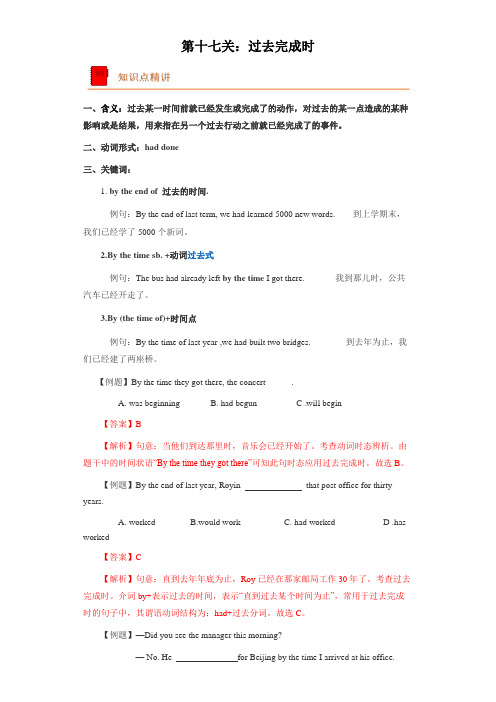
第十七关:过去完成时一、含义:过去某一时间前就已经发生或完成了的动作,对过去的某一点造成的某种影响或是结果,用来指在另一个过去行动之前就已经完成了的事件。
二、动词形式:had done三、关键词:1. by the end of 过去的时间.例句:By the end of last term, we had learned 5000 new words. 到上学期末,我们已经学了5000个新词。
2.By the time sb. +动词过去式例句:The bus had already left by the time I got there. 我到那儿时,公共汽车已经开走了。
3.By (the time of)+时间点例句:By the time of last year ,we had built two bridges. 到去年为止,我们已经建了两座桥。
【例题】By the time they got there, the concert______.A.was beginningB. had begun C .will begin【答案】B【解析】句意:当他们到达那里时,音乐会已经开始了。
考查动词时态辨析。
由题干中的时间状语“By the time they got there”可知此句时态应用过去完成时。
故选B。
years.A.workedB.would workC. had worked D .has worked【答案】C【解析】句意:直到去年年底为止,Roy已经在那家邮局工作30年了。
考查过去完成时。
介词by+表示过去的时间,表示“直到过去某个时间为止”,常用于过去完成时的句子中,其谓语动词结构为:had+过去分词。
故选C。
【例题】—Did you see the manager this morning?A . has leftB . left C.was leaving D . had left【答案】D【解析】句意:——你今天早上见到经理了吗?——没有。
(完整版word)过去完成时总复习经典例题、习题含答案

(完整版word)过去完成时总复习经典例题、习题含答案一、初中英语过去完成时1.—I ______ know you can play the piano so well.—Thank you.A. didn'tB. don'tC. can't【答案】 A【解析】【分析】句意:——我不知道你钢琴弹得那么好。
——谢谢。
A. didn't不,一般过去时态,指过去的状态及过去发生的动作;B. don't不,一般现在时态,指经常性、习惯性的动作;C. can't不能,指能力;不可能,表示否定的推测。
根据语境,说话时我已知道你钢琴弹得好,不知道是过去的状态,用一般过去时,故选A。
2.— How long has the train been away?— Sorry. I don't know. By the time I got here, the train ________.A. has leftB. was leavingC. had been awayD. had left【答案】 C【解析】【分析】句意:——火车离开多久了?——很抱歉。
我不知道。
我到这儿的时候,火车已经离开了。
由By the time I got here可知该用过去完成时,所以选C。
【点评】考查动词时态。
3.By the time he ______________ at the cinema, the movie ______________ for five minutes.A. arrived; had begunB. had arrived; had begunC. arrived; had been onD. had arrived; had been on【答案】 C【解析】【分析】句意:当他到达电影院时,电影已经开演五分钟了。
arrived到达,一般过去时;had begun开始,过去完成时,had been on进行,上映;begin开始,是短暂性动词,不能和段时间连用,根据for five minutes.故排除AB,be on进行,上映,表状态,可和段时间连用,by the time到……时候,从句用一般过去时,表示“截止到从句动作发生时,主句动作已经完成,即过去的过去”,主句用过去完成时,故选C。
初中英语语法练习题 过去完成时(带答案和解析)

过去完成时选择题【题目】He asked me where I ____ during the summer holidays.A. had beenB. had goneC.wentD.was【难度】中等【答案】A【解析】句意:“他问我暑假期间去哪了"。
据句意可知说话者已经从某地回来了。
所以用句型: had been,故选A。
【题目】I ____ 900 English words by the time I was ten.A. learnedB.was learningC.had learnedD. learn【难度】基础【答案】C【解析】句意:在我十岁的时候我已经记住了900个英语单词了。
结合by the time I was ten可知动作发生在过去的过去,故用过去完成时had+过去分词,故答案是C。
【题目】By the time my parents reached home yesterday, I ____the dinner already.A. had cookedB. cookedC. have cookedD. was cooked【难度】中等【答案】A【解析】句意:当我父母昨天到家的时候,我已经做好了晚饭。
由前半句中的reached和yesterday,可知“我父母到家”发生在过去,而“我做好晚饭”发生在“我父母到家"之前,即过去的过去,故应用过去完成时。
故选A。
【题目】She said she ______ the principle already.A. has seenB. sawC. will seeD. had seen【难度】基础【答案】D【解析】句意:她说她已经见过校长了。
见校长这个动作发生在过去的过去,故用过去完成时。
故选D。
【题目】She said her family _____ themselves ______ the army during the war.A. has hidden; fromB. had hidden;fromC. has hidden;withD. had hidden; with【难度】中等【答案】B【解析】句意:她说她的家人在战争期间躲避开了军队。
高中英语语法复习讲义+训练:动词的时态(含答案)

中学英语语法复习讲义——动词的时态一. 概念:时态是英语谓语动词的一种形式,表示动作发生的时间和所处的状态.英语中的时态是通过动词形式本身的变更来实现的.英语有16种时态,但中学阶段较常用的有十种:一般现在时,一般过去时,一般将来时,过去将来时,现在进行时,过去进行时,将来进行时,过去完成时,英在完成时和现在完成进行时.二.相关学问点精讲1.一般现在时的用法1) 常常性或习惯性的动作,常与表示频腮度的时间状语连用。
时间状语:every…, sometimes,at…, on Sunday。
例如:I leave home for school at 7 every morning. 每天早上我七点离开家。
2) 客观真理,客观存在,科学事实。
例如:The earth moves around the sun. 地球绕太阳转动。
Shanghai lies in the east of China. 上海位于中国东部。
3) 表示格言或警句。
例如:Pride goes before a fall.骄者必败。
留意:此用法假如出现在宾语从句中,即使主句是过去时,从句谓语也要用一般现在时。
例:Columbus proved that the earth is round. 哥伦布证明了地球是圆的。
4) 现在时刻的状态、实力、性格、特性。
例如:I don't want so much. 我不要那么多。
Ann writes good English but does not speak well. 安英语写得不错,讲的可不行。
比较:Now I put the sugar in the cup. 把糖放入杯子。
I am doing my homework now. 我正在做功课。
第一句用一般现在时,用于操作演示或指导说明的示范性动作,表示言行的瞬间动作。
其次句中的now是进行时的标记,表示正在进行的动作的客观状况,所以后句用一般现在时。
高三英语语法复习课件被动语态

teacher. 2. 一般过去时:
They agreed on the building of a new car factory last month. The building of a new car factory was agreed on last month. The students didn't forget his lessons easily. His lessons were not easily forgotten.
→We were told to follow her instructions. 注意:在see, watch, hear, notice, listen to, look at, make, feel 等动词后作宾语补足语的动词不定式都不带 to,但改成被动语态后 都带to,这时不定式为主语补足语,也就是说不定式作主语补足语 不存在省略to 的问题。
→ A special classhe school.
1.把主动语态的宾语变成被动语态的主语。 2.把主动语态的谓语变成被动语态的be + 过去分词,时态要与原句 保持一致。 3.把主动语态的主语变为介词by 的宾语,放在被动语态里谓语动词 之后,by 短语可以省略。如果原句主语是地点名词,在被动语态中 用in + 地点名词作状语。
him.
(四) 被 动 语 态 的 使 用
1.当不知道或没有必要指出动作的执行者时,常用被动语态,这时 往往不用by 短语。 “Mr. White, the cup with mixture was broken after class. ” (只是告诉老师杯子坏了,不知是谁弄坏的,或不想说出谁弄坏的)。 2.突出或强调动作的承受者,如果需要说出动作的执行者,用by 短 语。 These records were made by John Denver. The cup was broken by Paul. 3.当汉语句子的主语既不是动作的执行者,也不是动作的承受者时, 这时常用in + 名词作状语,而代替 by 短语。 These cars were made in China. 15, 000 cars will be produced each year in the new factory.
高中英语语法-过去完成时与练习题

高中英语语法过去完成时与练习题任何时态都是“时间”与“动作的意义”的结合。
过去完成时的时间很明显是“过去”;其动作的意义就是已经发生,换句话说就是完成了的情况。
结构过去完成时的基本结构是:“had + 动词的过去分词”。
例如:I had learned 2,000 English words by the end of last term. 到上学期期末为止我已经学了2,000个英语单词。
实质过去完成时表示在过去了的某个时间或动作之前所发生的动作,其实质就是“过去的过去”。
例如:When the teacher came into the classroom,Liu Hong had gone home. 当老师走进教室时,刘红已经回家了。
(“回家”发生在过去的动作“走进”之前)搭档1. “介词by +含一般过去时态的句子”。
介词by 本身表示“在……之前;到……为止”。
例如:Edison had built a chemistry lab by the time he was ten. 爱迪生十岁的时候就已经建立了一个化学实验室。
2. “时间状语从句”。
例如:When my mother got home,I had already done 10 maths problems. 当妈妈到家时,我已经做了十道数学题。
3. “宾语从句”或“间接引语”。
例如:The teacher asked if we had finished doing our homework. 老师问我们是否做完了作业。
He said that the had he visited the place twice. 他说这个地方他已经参观过两次了。
注意1. 和现在完成时不同,过去完成时有时也可以用在含有表示过去的时间状语的句子中。
例如:They told me that the letter had arrived on May 3rd. 他们告诉我信件五月三号就到了。
中考英语语法练习-过去完成时 (1)
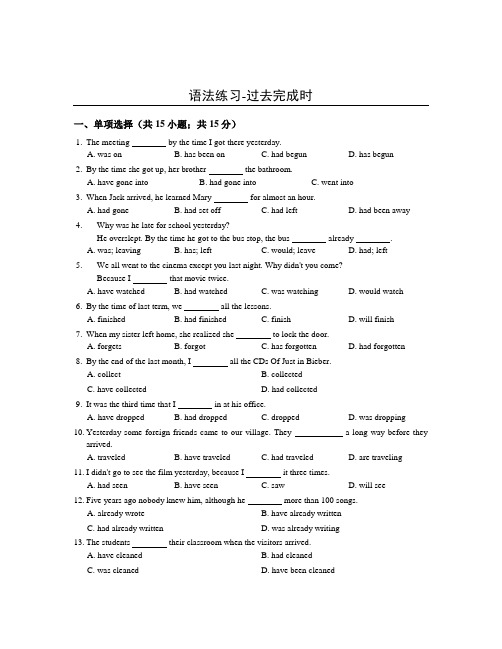
语法练习-过去完成时一、单项选择(共15小题;共15分)1. The meeting by the time I got there yesterday.A. was onB. has been onC. had begunD. has begun2. By the time she got up, her brother the bathroom.A. have gone intoB. had gone intoC. went into3. When Jack arrived, he learned Mary for almost an hour.A. had goneB. had set offC. had leftD. had been away4. --- Why was he late for school yesterday?--- He overslept. By the time he got to the bus stop, the bus already .A. was; leavingB. has; leftC. would; leaveD. had; left5. --- We all went to the cinema except you last night. Why didn't you come?--- Because I that movie twice.A. have watchedB. had watchedC. was watchingD. would watch6. By the time of last term, we all the lessons.A. finishedB. had finishedC. finishD. will finish7. When my sister left home, she realized she to lock the door.A. forgetsB. forgotC. has forgottenD. had forgotten8. By the end of the last month, I all the CDs Of Just in Bieber.A. collectB. collectedC. have collectedD. had collected9. It was the third time that I in at his office.A. have droppedB. had droppedC. droppedD. was dropping10. Yesterday some foreign friends came to our village. They a long way before theyarrived.A. traveledB. have traveledC. had traveledD. are traveling11. I didn't go to see the film yesterday, because I it three times.A. had seenB. have seenC. sawD. will see12. Five years ago nobody knew him, although he more than 100 songs.A. already wroteB. have already writtenC. had already writtenD. was already writing13. The students their classroom when the visitors arrived.A. have cleanedB. had cleanedC. was cleanedD. have been cleaned14. By the time I got home, mom the meal.A. cookB. has cookedC. had cookedD. is cooking15. When I got up in the morning, the rain already.A. stopsB. will stopC. has stoppedD. had stopped二、适当形式填空(单句适当形式)(共10小题;共10分)16. They (buy) the map of the country before they left.17. Before John Woo went to the USA, he (be) a famous director in Hong Kong for many years.18. The snow (stop) when she woke up and the sun was shining brightly.19. By the end of last year, Mary (send) twenty e-mails to her pen friend, Jack.20. The stranger asked me how long I (study) English.21. I saw Xia Jie yesterday. We (not see) each other since I left Beijing.22. I didn't go to see the film yesterday because I (see) it before.23. By 5.30 yesterday afternoon he (finish) writing the laboratory report.24. I didn't lend her my book because she (buy) one in the bookshop.25. My parents already (have) dinner by the time I got home.三、单句改错(共5小题;共5分)26. When he got to the cinema, the movie has been on for ten minutes.27. I met Yang Hua yesterday. I have never met her since we leftschool.28. I didn't finish writing my test because I run out of time.29. His friend went to Xi'an two days before.30. My grandfather had joined in the Party for forty years.四、翻译(根据中文提示完成句子)(共5小题;共10分)31. 当我们到电影院,电影已经开始半小时了。
初中英语语法知识点总结及练习
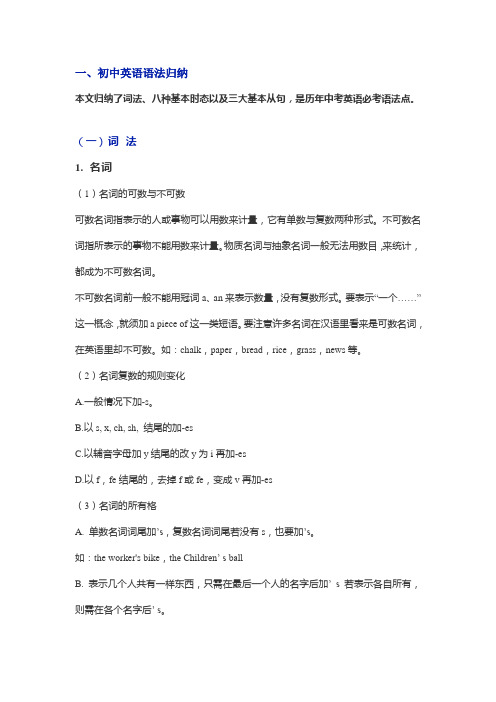
一、初中英语语法归纳本文归纳了词法、八种基本时态以及三大基本从句,是历年中考英语必考语法点。
(一)词法1. 名词(1)名词的可数与不可数可数名词指表示的人或事物可以用数来计量,它有单数与复数两种形式。
不可数名词指所表示的事物不能用数来计量。
物质名词与抽象名词一般无法用数目,来统计,都成为不可数名词。
不可数名词前一般不能用冠词a、an来表示数量,没有复数形式。
要表示“一个……”这一概念,就须加a piece of这一类短语。
要注意许多名词在汉语里看来是可数名词,在英语里却不可数。
如:chalk,paper,bread,rice,grass,news等。
(2)名词复数的规则变化A.一般情况下加-s。
B.以s, x, ch, sh, 结尾的加-esC.以辅音字母加y结尾的改y为i再加-esD.以f,fe结尾的,去掉f或fe,变成v再加-es(3)名词的所有格A. 单数名词词尾加’s,复数名词词尾若没有s,也要加’s。
如:the worker's bike,the Children’ s ballB. 表示几个人共有一样东西,只需在最后一个人的名字后加’ s若表示各自所有,则需在各个名字后’ s。
如:This is Lucy and Licy’ s room.These are Kate's and jack’ s rooms.C. 如果是通过在词尾加—s构成的复数形式的名词,只加’。
如:the students’ books,the girls’ blouses(另外:名词+of+名词名词是有生命的,我们就用’s结构来表示所有关系。
如果名词所表示的事物是无生命的,我们就要用名词+of+名词的结构来表示所有关系。
) 2. 代词人称代词,物主代词,反身代词,指示代词,不定代词(1)人称代词第一人称单数I me my mine myself复数 we us our ours ourselves第二人称单数 you you your yours yourself复数 you you your yours yourselves第三人称单数 he him his his himselfshe her her hers herselfit it its its itself复数 they them their theirs themselves(2)物主代词物主代词的用法:形容词性物主代词后面一定要跟上一个名词;名词性物主代词可作主语、表语、宾语。
深圳牛津版八年级下英语期末语法总复习
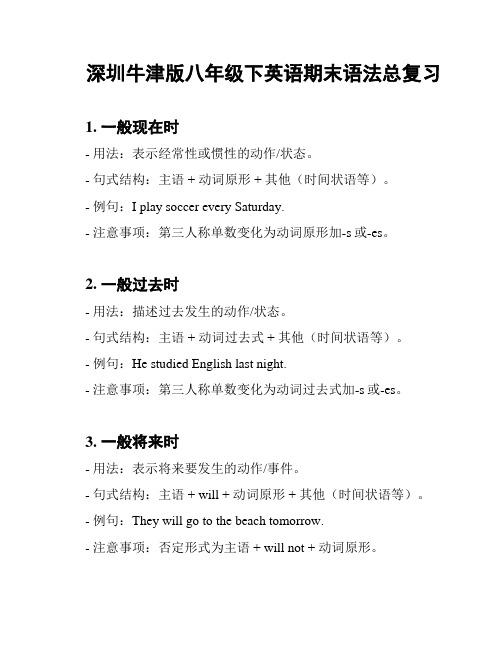
深圳牛津版八年级下英语期末语法总复习1. 一般现在时- 用法:表示经常性或惯性的动作/状态。
- 句式结构:主语 + 动词原形 + 其他(时间状语等)。
- 例句:I play soccer every Saturday.- 注意事项:第三人称单数变化为动词原形加-s或-es。
2. 一般过去时- 用法:描述过去发生的动作/状态。
- 句式结构:主语 + 动词过去式 + 其他(时间状语等)。
- 例句:He studied English last night.- 注意事项:第三人称单数变化为动词过去式加-s或-es。
3. 一般将来时- 用法:表示将来要发生的动作/事件。
- 句式结构:主语 + will + 动词原形 + 其他(时间状语等)。
- 例句:They will go to the beach tomorrow.- 注意事项:否定形式为主语 + will not + 动词原形。
4. 现在进行时- 用法:表示当前正在进行的动作。
- 句式结构:主语 + is/are + 动词-ing + 其他(时间状语等)。
- 例句:She is watching TV now.- 注意事项:第三人称单数变化为is,第三人称复数和其他人称变化为are。
5. 过去进行时- 用法:表示过去某个时间正在进行的动作。
- 句式结构:主语 + was/were + 动词-ing + 其他(时间状语等)。
- 例句:They were playing basketball yesterday.- 注意事项:was用于第一、第三人称单数,were用于第二人称单数和所有人称复数。
6. 将来进行时- 用法:表示将来某个时间正在进行的动作。
- 句式结构:主语 + will be + 动词-ing + 其他(时间状语等)。
- 例句:We will be having dinner at that time tomorrow.- 注意事项:无特殊注意事项。
九年级语法-过去完成时(附习题及答案)
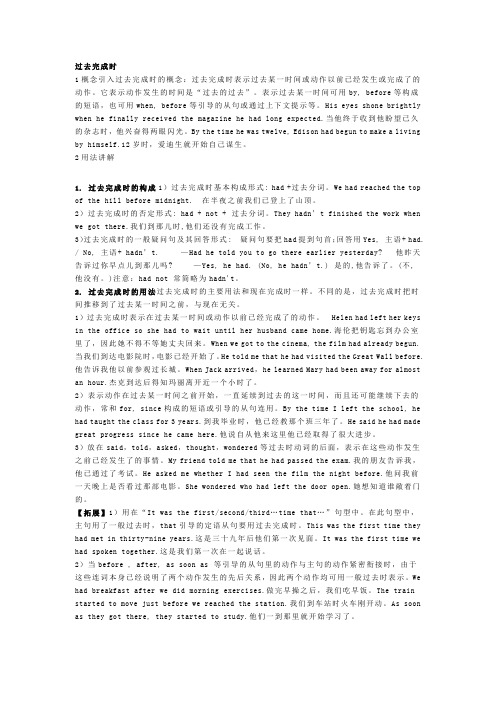
过去完成时1概念引入过去完成时的概念:过去完成时表示过去某一时间或动作以前已经发生或完成了的动作。
它表示动作发生的时间是“过去的过去”。
表示过去某一时间可用by, before等构成的短语,也可用when, before等引导的从句或通过上下文提示等。
His eyes shone brightly when he finally received the magazine he had long expected.当他终于收到他盼望已久的杂志时,他兴奋得两眼闪光。
By the time he was twelve, Edison had begun to make a living by himself.12岁时,爱迪生就开始自己谋生。
2用法讲解1. 过去完成时的构成1)过去完成时基本构成形式: had +过去分词。
We had reached the top of the hill before midnight. 在半夜之前我们已登上了山顶。
2)过去完成时的否定形式: had + not + 过去分词。
They hadn’t finished the work when we got there.我们到那儿时,他们还没有完成工作。
3)过去完成时的一般疑问句及其回答形式: 疑问句要把had提到句首;回答用Yes, 主语+ had. / No, 主语+ hadn’t.—Had he told you to go there earlier yesterday? 他昨天告诉过你早点儿到那儿吗? —Yes, he had. (No, he hadn’t.) 是的,他告诉了。
(不,他没有。
)注意:had not 常简略为hadn't。
2. 过去完成时的用法过去完成时的主要用法和现在完成时一样。
不同的是,过去完成时把时间推移到了过去某一时间之前,与现在无关。
1)过去完成时表示在过去某一时间或动作以前已经完成了的动作。
语法过去完成时will讲解与练习
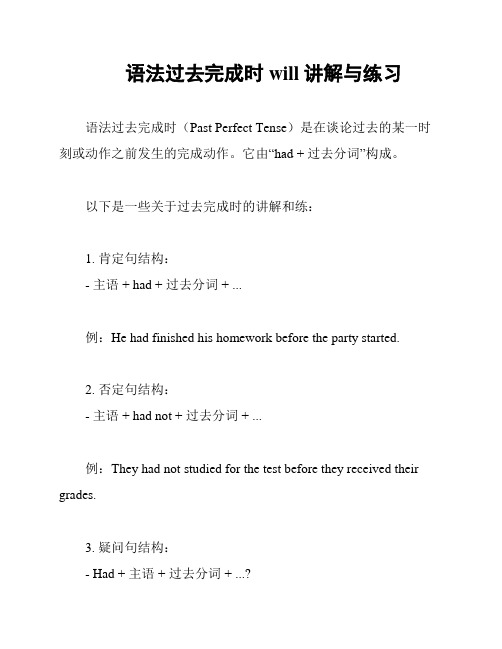
语法过去完成时will讲解与练习语法过去完成时(Past Perfect Tense)是在谈论过去的某一时刻或动作之前发生的完成动作。
它由“had + 过去分词”构成。
以下是一些关于过去完成时的讲解和练:1. 肯定句结构:- 主语 + had + 过去分词 + ...例:He had finished his homework before the party started.2. 否定句结构:- 主语 + had not + 过去分词 + ...例:They had not studied for the test before they received their grades.3. 疑问句结构:- Had + 主语 + 过去分词 + ...?例:Had she ever been to that city before she moved there?练:1. 填空:- She __________ (never visit) that country before she went on vacation there.- By the time I arrived, they __________ (already leave).- The train __________ (delay) for two hours before it finally arrived.2. 对话整理:根据提供的句子重新排列对话,并使用过去完成时。
A: (1) Had you finished your project before the deadline?A: (2) Oh, so you hadn't submitted it yet?B: (4) No, I hadn't. I needed more time to fix the problems.请根据以上讲解和练,完成你的文档标题为“语法过去完成时讲解与练”的任务。
根据(完整版)英语过去完成时的常见错误总结
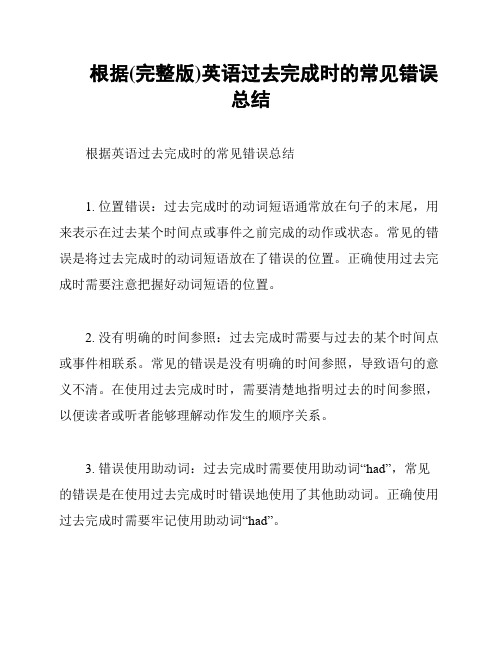
根据(完整版)英语过去完成时的常见错误
总结
根据英语过去完成时的常见错误总结
1. 位置错误:过去完成时的动词短语通常放在句子的末尾,用来表示在过去某个时间点或事件之前完成的动作或状态。
常见的错误是将过去完成时的动词短语放在了错误的位置。
正确使用过去完成时需要注意把握好动词短语的位置。
2. 没有明确的时间参照:过去完成时需要与过去的某个时间点或事件相联系。
常见的错误是没有明确的时间参照,导致语句的意义不清。
在使用过去完成时时,需要清楚地指明过去的时间参照,以便读者或听者能够理解动作发生的顺序关系。
3. 错误使用助动词:过去完成时需要使用助动词“had”,常见的错误是在使用过去完成时时错误地使用了其他助动词。
正确使用过去完成时需要牢记使用助动词“had”。
4. 混淆过去完成时与过去时:过去完成时与过去时的区别是,过去完成时强调动作在过去某个时间点或事件之前完成,而过去时只表示过去发生的动作或状态。
常见的错误是混淆了过去完成时和过去时的用法。
在正确使用过去完成时时,需要明确两者的区别。
5. 错误的语法结构:在使用过去完成时时,需要注意语法结构的正确性。
常见的错误是错误地构造了过去完成时的语法结构,导致语句不通顺或不符合语法规则。
正确使用过去完成时需要注意语法结构的准确性。
总结:在使用英语过去完成时时,需要注意避免常见的错误,包括位置错误、没有明确的时间参照、错误使用助动词、混淆过去完成时与过去时的用法以及错误的语法结构。
正确使用过去完成时可以帮助我们表达过去的动作顺序和完成程度。
(英语)高考英语总复习--过去完成时

(英语)高考英语总复习--过去完成时一、单项选择过去完成时1.Arriving at the party hurriedly, we were disappointed to find that the band playing. A.stopped B.will stopC.had stopped D.has stopped【答案】C【解析】解析:匆忙地到达晚会,我们很失望地发现乐队已经停止演奏了。
题干中的were disappointed的状态发生在过去,stop这个动作发生在其之前,故应用过去完成时。
所以选C。
2. Chinese scientists ______ on Tuesday that they ______ a low-cost welding robot, which can help improve welding efficiency for small factories.A.announces; had invented B.announced; have invented C.announced; had invented D.announces; have invented【答案】C【解析】试题分析:考查时态。
第一空根据时间状语on Tuesday可知用一般过去时;第二空动词invent所发生的动作在announce之前,故用过去完成时。
句意:中国科学家在周二宣布,他们已经发明了低成本的焊接机器人,可以帮助提高小工厂焊接效率。
故C正确。
考点:考查时态3.Silk ________ one of the primary goods traded along the Silk Road by about 100 BC . A.had become B.was becomingC.has become D.is becoming【答案】A【解析】【详解】考查时态。
句意:到公元前100年为止,丝绸已经成为丝绸之路上交易的主要商品之一。
中考基础语法专项复习单句语法填空练习--动词现在完成时与过去完成时(90题)
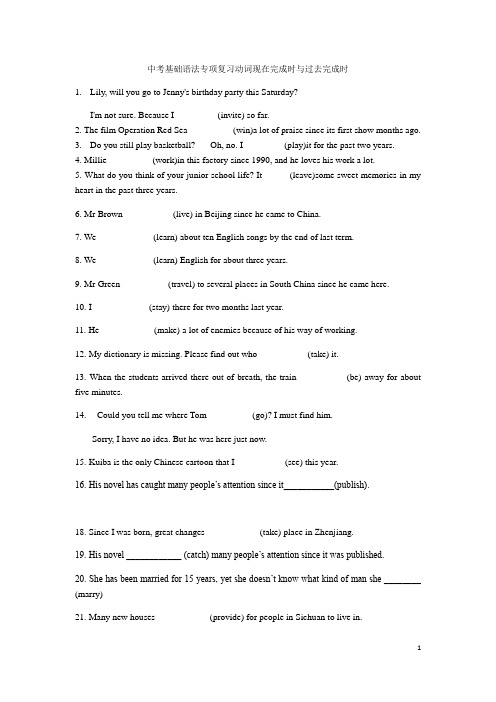
中考基础语法专项复习动词现在完成时与过去完成时1. --Lily, will you go to Jenny's birthday party this Saturday?--I'm not sure. Because I _________(invite) so far.2. The film Operation Red Sea__________(win)a lot of praise since its first show months ago.3. --Do you still play basketball? --Oh, no. I_________(play)it for the past two years.4. Millie__________(work)in this factory since 1990, and he loves his work a lot.5. What do you think of your junior school life? It______(leave)some sweet memories in my heart in the past three years.6. Mr Brown___________(live) in Beijing since he came to China.7. We ____________(learn) about ten English songs by the end of last term.8. We ____________(learn) English for about three years.9. Mr Green __________(travel) to several places in South China since he came here.10. I ____________(stay) there for two months last year.11. He____________(make) a lot of enemies because of his way of working.12. My dictionary is missing. Please find out who___________(take) it.13. When the students arrived there out of breath, the train___________(be) away for about five minutes.14. -- Could you tell me where Tom__________(go)? I must find him.-- Sorry, I have no idea. But he was here just now.15. Kuiba is the only Chinese cartoon that I___________(see) this year.16. His novel has caught many people’s attention since it___________(publish).18. Since I was born, great changes____________(take) place in Zhenjiang.19. His novel ____________ (catch) many people’s attention since it was published.20. She has been married for 15 years, yet she doesn’t know what kind of man she ________ (marry)21. Many new houses____________(provide) for people in Sichuan to live in.22. Though they are such little children, they___________(work) out so many difficult math problems.23. Do you know Betty very well? Yes, she and I ___________(be) friends since we met in Guangzhou last summer.24. --I’m sorry to have kept you waiting.--Oh, not at all. I ____________(be) here only a few minutes.25. We _________(began)to learn English five years ago. We __________(learn) it for five years up to now.26. --What a nice bike! How long ________you _______(have) it? -- Just two weeks.28. --What do you think of the film Harry Potter? --It is very nice. I_________(see) it twice.29. Hurry up! The play __________ (be) on for ten minutes.30. I can’t go to see the film tonight, because I _________(lose) my ticket.32. Jane __________ (buy)a new dress every month when she was in Shanghai.33. I can’t go to see the film tonight, because I _________ (lose)my ticket.34. --What do you think of the film Harry Potter? --It is very nice. I __________ (see)it twice.35. By the end of last year, another new gymnasium __________(complete) in Beijing.37. --Do you know Betty very well?--Yes, she and I __________(become)friends since we met in Guangzhou last summer.38. When and where to build the new factory _________ (decide)yet.39. --How do you like Beijing, Mr Smith?--Oh, I ___________(not visit) such a beautiful city before.40. --Tom, may I borrow your book Chicken Soup? --Sorry, I _________(lend) it to Mary.41. I can't go to the theater tonight because I _________(lose) my ticket.42. Mrs Smith _________(leave)her keys in the office, so she had to wait until her husband _________ (come)home.50. I __________(have) this coat for very long. It still looks quite new.51. He __________(be)away from home for nearly three weeks.52. My uncle __________(work) in that factory since 1958.53. I __________(know) her since she was a little girl.54. He __________(be) in the army for three years.55. By the end of last term we __________ English for two years.56. --What did Mr Jones do before he moved here?--He __________(drive)a city bus for over twenty-five years.57. When to start new project and where to build the new factory __________ (decide)yet.59. How long has Mr. White been a member of Greener China since he__________(come) to China?60. He __________(learn) to play the piano before he was 11 years old.61. He __________(work) in the factory for three years before he joined the Army.62. The police found that the house_________(break)into and a lot of things _______(steal).63. By the end of this century, we__________ (build)ours into a strong modern country.64. We ___________(finish)the work by six yesterday evening.66. Mrs. Wu told me that her sister________ (leave) about two hours before.67. When I reached home, my parents __________(have)their supper.68. It seems that the old man __________(lost)something important.69. She __________(teach)in this school since the past ten years.71. The job proved to be much more difficult than I__________(expect).72. We couldn’t catch up with the others because they _________(start)too long before us.75. By the end of next July this building____________(finish).77. When Jack arrived he learned Mary __________(be)away for almost an hour.78. That rich old man _________ (make) a will before he died.79. They had studied the map of the country before they ________ (leave).80. I __________ (turn) off all the lights before I went to bed.81. Tom said he __________ (read) the book twice.82. We __________(learn) about 4000 English words by the end of last term.83. He said he _________already_________(give) the book to the teacher.84. The film __________(be) on for nearly fifteen minutes when I got to the cinema.85. Great changes __________(take)place in our country since 1978.86. I __________(hear) from my daughter since last month.87. Xiao Lin __________(be) away from here for about two hours.88. --Where is professor Lee? --He _________(go) to the library. He’ll come back soon.89. He told me that he __________ (visit)the Great Wall the year before.90. John stopped having a rest because he __________(work) for three hours.1.haven’t been invited;2.has won;3.have played;4.has worked;5.has left;6.has lived;7.had learnt;8.have learned;9.has traveled; 10.have stayed; 11.has made; 12.has taken; 13.has been;14. has gone; 15.have seen; 16.was published; 17. has influenced; 18.have taken; 19. has caught; 20. has married; 21. have been provided; 22. have worked; 23.have been; 24.have been; 25.begun; have learnt; 26.have had; 27.have met; 28.have seen; 29.has been; 30.have lost; 31.had left; 32.bought; 33.have lost; 34.have seen; 35.had been completed; 36.have met;37.have become; 38.hasn’t been decided; 39.haven’t visit; 40.have lent; 41.have lost; 42.had left; came; 43.graduates; 44.haven’t heard; 45.has rung; 46.had been; 47.had repaired;48.have been; haven’t seen; 49.has won; 50.have had; 51.has been; 52.has worked; 53.have known; 54.has been; 55.had studied; 56.has drive n; 57.haven’t been decided; 58.had left;59.came; 60.had learn; 61.had worked; 62.had been broke; had been stolen; 63.will have built;64.had finished; 65.had wanted; 66.had left; 67.had had; 68.has lost; 69.has taught; 70.had left;71.had expect; 72.had s tarted; 73.hadn’t heard; 74.had seated; 75.will have been finished;76.broke; 77.had been; 78. had made; 79.left; 80. had turned; 81.had read; 82.had; given;84.has been; 85.has taken; 86.have heard; 87.has been; 88.has gone; 89.had visited; 90.having; has worked;。
初中英语语法归纳(过去完成时)
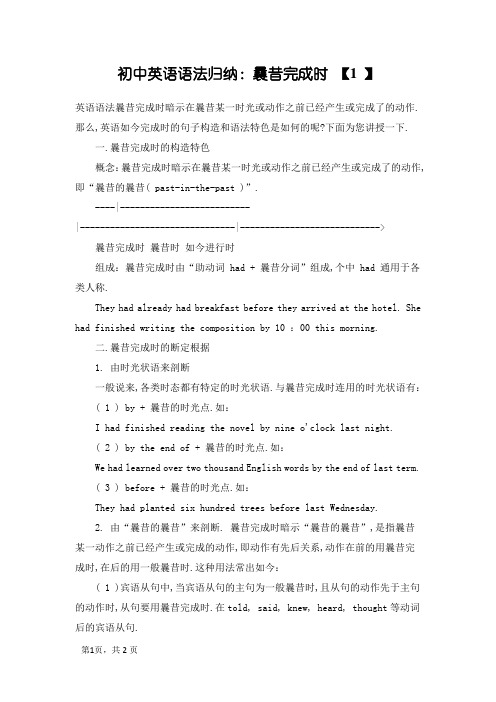
初中英语语法归纳:曩昔完成时【1 】英语语法曩昔完成时暗示在曩昔某一时光或动作之前已经产生或完成了的动作.那么,英语如今完成时的句子构造和语法特色是如何的呢?下面为您讲授一下.一.曩昔完成时的构造特色概念:曩昔完成时暗示在曩昔某一时光或动作之前已经产生或完成了的动作,即“曩昔的曩昔( past-in-the-past )”.----|--------------------------|-------------------------------|---------------------------->曩昔完成时曩昔时如今进行时组成:曩昔完成时由“助动词 had + 曩昔分词”组成,个中 had 通用于各类人称.They had already had breakfast before they arrived at the hotel. She had finished writing the composition by 10 :00 this morning.二.曩昔完成时的断定根据1. 由时光状语来剖断一般说来,各类时态都有特定的时光状语.与曩昔完成时连用的时光状语有:( 1 ) by + 曩昔的时光点.如:I had finished reading the novel by nine o'clock last night.( 2 ) by the end of + 曩昔的时光点.如:We had learned over two thousand English words by the end of last term.( 3 ) before + 曩昔的时光点.如:They had planted six hundred trees before last Wednesday.2. 由“曩昔的曩昔”来剖断. 曩昔完成时暗示“曩昔的曩昔”,是指曩昔某一动作之前已经产生或完成的动作,即动作有先后关系,动作在前的用曩昔完成时,在后的用一般曩昔时.这种用法常出如今:( 1 )宾语从句中,当宾语从句的主句为一般曩昔时,且从句的动作先于主句的动作时,从句要用曩昔完成时.在told, said, knew, heard, thought等动词后的宾语从句.如: She said that she had seen the film before.( 2 )状语从句中,在时光.前提.原因.方法等状语从句中,主.从句的动作产生有先后关系,动作在前的,要用曩昔完成时,动作在后的要用一般曩昔时.如: When I got to the station, the train had already left. After he had finished his homework, he went to bed.留意: before, after ,as soon as引诱的时光状语从句中,因为 before 和after 本身已表达了动作的先后关系,若主.从句暗示的动作慎密相连,则主.从句都用一般曩昔时.如:Where did you study before you came here?After he closed the door, he left the classroom.(3)暗示意向的动词,如hope, wish, expect, think, intend, mean, suppose等,用曩昔完成时暗示"本来…,未能…"We had hoped that you would come, but you didn't. 3. 根据上.下文来剖断.I met Wang Tao in the street yesterday. We hadn't seen each other since he went to Beijing.三.曩昔完成时的重要用法1. 曩昔完成时暗示一个动作或状况在曩昔某一时光或动作之前已经完成或停止,即产生在“曩昔的曩昔”.如:When I woke up, it had stopped raining. 我醒来时,雨已经停了.(主句的动作产生在“曩昔的曩昔”)2. 曩昔完成时是一个相对的时态,暗示的是“曩昔的曩昔”,只有和曩昔某一时光或某一动作比拟较时才应用它.如:He told me that he had written a new book. (had written 产生在 told 之前 )3. 曩昔完成时须要与一个暗示曩昔的时光状语连用,它不克不及分开曩昔时光而自力消失.。
- 1、下载文档前请自行甄别文档内容的完整性,平台不提供额外的编辑、内容补充、找答案等附加服务。
- 2、"仅部分预览"的文档,不可在线预览部分如存在完整性等问题,可反馈申请退款(可完整预览的文档不适用该条件!)。
- 3、如文档侵犯您的权益,请联系客服反馈,我们会尽快为您处理(人工客服工作时间:9:00-18:30)。
(3)在told, said, knew, heard, thought等动词后的宾语从 ) 等动词后的宾语从 句。She said (that) she had never been to Paris. ( 4)在过去不同时间发生的两个动作中 , 发生在先 , 用 ) 在过去不同时间发生的两个动作中,发生在先, 过去完成时;发生在后,用一般过去时。 过去完成时;发生在后,用一般过去时。 When the police arrived, the thieves had run away. (5)过去完成时的时间状语 )过去完成时的时间状语before, by, (by the time, , by the end of),until , when, after, as soon as ) (6)表示意向的动词,如hope, wish, expect, think, plan, )表示意向的动词, mean, suppose等,用过去完成时表示 原本 ,未能 原本…,未能…" 等 用过去完成时表示"原本 We had hoped that you would come, but you didn't.
1. The old man _____ two days after he had been sent to hospital. A. died B. would die C. had died D. has died 2. Old McDonald gave up smoking for a while, but soon ______ to his old ways. A. returned B. returns C. was returning D. had returned 4. I _____ to take a good holiday this year, but I wasn’t able to get away. A. hope B. have hoped C. had hoped D. hoped 5. Helen _____ her key in the office so she had to wait until her husband _____ home. A. has left; comes B. left; had come C. had left; came D. had left; would come
初三英语总复习语法系列训练
英语的时态
过去完成时
过去完成时的用法
1、概念:表示过去的过去。 、概念:表示过去的过去。 -----------|----------------|--------------------|----> 那时以前 那时 现在 其结构是:had + 过去分词 其结构是: 2、过去完成时的用法: 、过去完成时的用法: ( 1)过去完成时表示过去某一时刻或者某一动作之前完成的动 ) 作或状态;句中常用by, before, until, when等词引导的时间状语。 等词引导的时间状语。 作或状态;句中常用 等词引导的时间状语 By the end of last year we had built five new houses. I had learnt 5000 words before I entered the university. ( 2)过去完成时的动词还可以表示过去某一时刻之前发生的动 ) 作或者状态持续到过去某个时间或者持续下去。 作或者状态持续到过去某个时间或者持续下去。 Before he slept, he had worked for 12 hours.
用一般过去时代替完成时
1) 两个动作如按顺序发生 , 又不强调先后 , 或用 两个动作如按顺序发生, 又不强调先后, 或用then,and,but , , 等连词时,多用一般过去时。 等连词时,多用一般过去时。 When she saw the mouse,she screamed. , My aunt gave me a hat and I lost it. 2) 两个动作相继发生,可用一般过去时;如第一个动作需要若干时 两个动作相继发生,可用一般过去时; 间完成,用过去完成时。 间完成,用过去完成时。 When I heard the news, I was very excited. 3) 叙述历史事实,可不用过去完成时,而只用一般过去时。 叙述历史事实,可不用过去完成时,而只用一般过去时。 Our teacher told us that Columbus discovered America in 1492.
常见错误: 常见错误:
• ①过去完成时与一般过去时使用混淆。例:We 过去完成时与一般过去时使用混淆。 learned two English songs by the end of last term. • ②过去完成时与现在完成时混淆。例:I have 过去完成时与现在完成时混淆。 known him before I was a student.
ห้องสมุดไป่ตู้
He said that he had learned some English before. By the time he was twelve, Edison had began to make a living by himself. Tom was disappointed that most of the guests had left when he arrived at the party.
